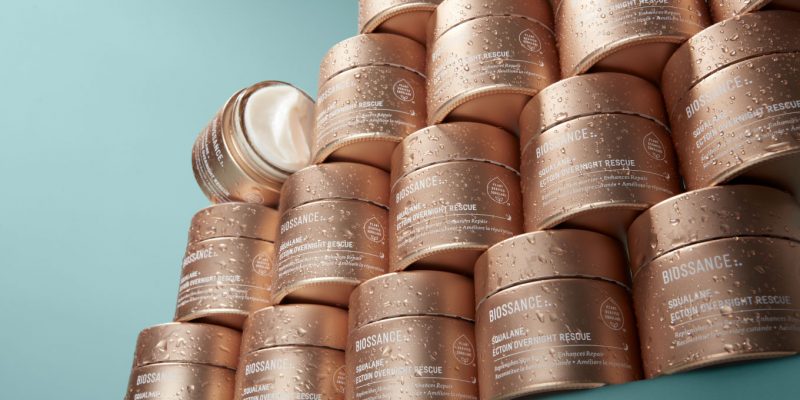Beauty
5 signs you have sensitive skin
Rosy cheeks and dry skin could mean your skin is of the sensitive type. Here are 5 ways to know for sure.
by : Ava Baccari- Mar 20th, 2014

When it comes to things that are sensitive by nature—like people or our skin, for instance—etiquette dictates that we take extra precaution to avoid any undue painful situations. And at least with skin care, there are tried and true approaches to take that can
prevent the dry patches and redness common to people with sensitive skin. But how can you tell if a rosy flush is due to an awkward exchange or a symptom of your sensitive skin type? We asked Anna Conte, an Aveda Purefessional, to share the top telltale signs of sensitive skin, and how to care for it without the backlash of flareups and breakouts.
Sign of sensitive skin: Dry patches
This may come as no surprise, but a telltale signifier of sensitive skin is the appearance of rough, dry patches on surface. Simply put, “Skin needs to be hydrated,” Conte says. Focus on
adding in regular moisture with gentle fragrance and oil-free products. “Stay away from anything alcohol based or anything too astringent,” she warns.
Avoid overuse of harsh and heavy creams, and instead opt for a
face serum to alleviate the flaking of dry skin. As a hydrating boost to your daily skin care routine, book an appointment for a facial treatment. “[Try] masques and treatments geared towards hydration,” says Conte. “And a
facial massage to reduce stress.”
8 ways to banish dry skin
Sign of sensitive skin: Skin is sensitive to hot and cold
When it comes to the seasonal changes, it seems like people with sensitive skin just can’t win: the Polar Vortex-like cold can cause windburn, while extreme heat leaves skin vulnerable to flare-ups. Avoid applying too-hot or too-cold temperatures to the face, advises Conte. “Cleanse skin with lukewarm water,” she adds (this will also prevent the skin from drying out further). And make sure skin is slathered in sun protection before leaving the house in the morning, to avoid sunburn or triggering rosacea.
SKIN CARE: Your winter to spring transition
How to develop a skin care routine for dry skin on the next page…
 Sign of sensitive skin: Acne or an uneven complexion
Sign of sensitive skin: Acne or an uneven complexion
The irony of having dry, sensitive skin is that the lack of moisture incites an over-production of oil to compensate, producing acne and a shiny surface on the face. To help rebalance the skin for a healthy-looking complexion, ensure that you are “Cleansing properly to remove makeup and pollution,” Conte advises. Try Aveda Pure Comfort Eye Makeup Remover, which can be used as a gentle cleanser.
And even if your skin is more of the sensitive type, it’s important to keep up with regular exfoliation (just limit to once per week). “Exfoliants that are liquid or cream based are best suited for sensitive skin,” says Conte. Incorporate a gentle scrub in your nighttime skin care routine. “Nighttime is best for exfoliation so skin is not exposed to sun or harsh elements.” For an added buffer against flare-ups, look for a facial treatment that includes gentle exfoliation.
Skin care: Your NIGHTTIME BEAUTY ROUTINE
Signs of sensitive skin: Constant redness or flushed look
Sometimes you can tell if skin if sensitive just by looking at it: it may have a puffy, rosy appearance to it. “Cold compresses help ease the skin by constricting the blood vessels to help skin calm down,” says Conte. Try a hydrating face mask infused with cooling ingredients (think cucumber and white tea extract) to soothe dry skin and prevent a red flush. “Ice cubes also help reduce itch and inflammation,” Conte adds.
GALLERY: 11 best anti aging serums
Signs of sensitive skin: It reacts to harsh ingredients
It’s not just that many face products contain drying agents that irritate already sensitive skin, but overloading the skin with too many of them can cause further inflammation. Avoid any active or synthetic ingredients that can aggravate dry skin and cause an allergic reaction.
Conte also advises that you regularly go through your skin care products and toss away anything that’s past its expiry date. And steer clear of chemical peels or microdermabrasion—basically any facial treatment that encourages resurfacing of the skin. A little extra TLC goes a long way with sensitive skin.
READ MORE:
8 ways to banish dry skin
Anti aging secrets
6 bad beauty habits that are making you breakout
Skin care: Your winter to spring transition
Newsletter
Join our mailing list for the latest and biggest in fashion trends, beauty, culture and celebrity.
Read Next

Fashion
Are Fashion Brands Getting Greener?
While the fashion industry is making a lot of noise about being more sustainable, a closer look shows that its earth-friendly commitments are often more illusion than reality.
by : Marouchka Franjulien- Apr 19th, 2024

Beauty
What Beauty Packaging Is Actually Sustainable?
We sought out leaders in the field to help us get to the bottom of the blue bin once and for all.
by : Victoria Christie- Apr 19th, 2024

Fashion
This Jewellery Brand Has a Whole New Look And It’s Everything
Here are the seven pieces we’re coveting.
by : ELLE Canada- Apr 10th, 2024




